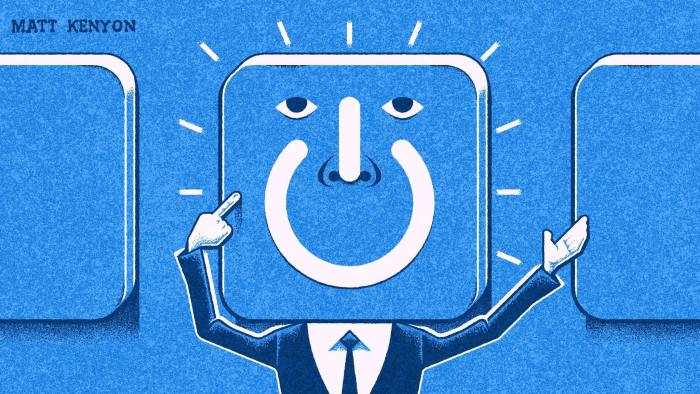The World Economic Forum in Davos has just opened. As the forum of movers and shakers has become bigger — some would say too big — over the years, it has turned into more of a dealmaking venue than a thought leadership salon. But Davos is still the greatest place in the world to put a finger to the wind and see what the key economic and political issues of the year will be. I’m betting that top of the list will be Big Tech’s attempt to rebrand itself.
达沃斯世界经济论坛(WEF)已经落下帷幕。随着这一推动者和塑造者的论坛逐年变大(有些人会说太大了),它已经变成了一个交易场所,而不是一个思想领袖沙龙。但是,达沃斯仍是这个世界上观望风向、看看今年的关键经济和政治问题将是什么的最佳场所。我敢打赌,排在首位的问题将是大型科技公司重塑自我的尝试。
The Fangs — Facebook, Amazon, Netflix and Google — are having a crisis that encompasses the cognitive, the political and the economic. Activists, regulators and even some tech executives themselves are calling for an investigation into the addictive nature of smartphones and social media.
FANG——Facebook、亚马逊(Amazon)、Netflix和谷歌(Google)的统称——正在经历一场引起学界、政界和经济界讨论的危机。活动人士、监管机构、甚至一些科技公司高管本人都在呼吁对智能手机和社交媒体的成瘾特性进行调查。
Just last week, Congress once again grilled Facebook, Google and Twitter about their management of extremist content. The bottom line They have no clear answers about how they are going to prevent their platforms from being used for things such as Russian election meddling, or by governments in places such as Myanmar to prepare their populations for death squads and genocide.
就在最近,美国国会再次询问了Facebook、谷歌和Twitter对极端主义内容的管理情况。底线在哪里?对于如何防止它们的平台被用于诸如俄罗斯干预选举的事情,或是被缅甸等地的政府用来让民众准备好参加敢死队和实行种族灭绝,这些公司没有给出明确的答案。
Indeed, there is evidence linking the rise of platform technologies with declining trust in liberal democracy itself. Fully 65 per cent of the population gets its news from platforms and aggregator sites, according to the Edelman Trust Barometer survey of 28 countries.
的确,有证据表明,平台技术的兴起与人们对自由民主本身的信任度下降有关。根据对28个国家进行的《爱德曼信任度调查报告》(Edelman Trust Barometer),整整65%的人口从平台和聚合网站获得新闻。
Sadly, the fact that Facebook, Google and Twitter now provide the world with most of its news has also coincided with a decline in trust in liberal democratic governments. The filter bubbles created by these platforms push people towards far right or left extremist content, and that has the tendency to erode their belief in existing institutions.
遗憾的是,在现在全世界大多数新闻由Facebook、谷歌和Twitter提供的同时,人们对自由民主政府的信任度在下降。由这些平台产生的过滤气泡(filter bubble)把人们推向极右或极左的极端内容,这就产生了一种削弱他们对现有机构信任度的趋势。
That is one reason it is so odd to me that the latest attempt by Facebook chief executive Mark Zuckerberg to “fix” the company’s problems involves pushing people away from news sites and towards friends and family. Unfortunately, the people we are closest to are the very ones who create our filter bubbles. The bubbles are quite profitable for the platforms, which can use them to funnel opaque political and corporate advertising to individuals, messaging that usually plays to their own prejudices.
这就是我对以下现象感觉如此奇怪的原因之一:Facebook首席执行官马克扎克伯格(Mark Zuckerberg)试图“解决”该公司问题的最新尝试,涉及让人们远离新闻网站,贴近朋友和家人。不幸的是,我们最亲近的人正是那些为我们制造了过滤气泡的人。这些气泡对平台来说是相当有利可图的,平台可以利用气泡将不透明的政治和企业广告推送给个人,而这些广告通常会迎合他们自己的偏见。
It’s very often stuff that would not look good in the light of day, which is one of the reasons that the Big Tech companies are lobbying against moves such as the Honest Ads Act, which would make them put their political advertising out into the clear light of day, like any other media company.
这些往往正是在日光下看起来不好的东西,这是大型科技公司正在游说反对《诚实广告法案》(Honest Ads Act)等措施的原因之一。该法案将迫使它们像任何其他媒体公司一样,把它们的政治广告放到大庭广众之下。
They also continue to lobby against the repeal of loopholes such as CDA230, which would kill the special and outdated subsidies Big Tech enjoyed as a young and nascent industry in the mid-1990s, rather than the largest economic and political force in the world. Perhaps, most importantly, they are not listening to their toughest critics.
大型科技公司还在继续游说反对堵上《通信规范法》第230条(CDA230)等漏洞,堵上这一漏洞将终止它们在1990年代中期作为一个年轻而新生的行业、而不是世界上最大的经济和政治力量所享有的特殊和过时的补贴。或许,最重要的是,它们没有听取最严厉的批评者的意见。
When you have a problem, and you are truly serious about solving it, you reach out to the people who are toughest on you. My own experience with Big Tech (which in recent months has been mainly with policy and PR people; since I started writing critical pieces, the top executives have not been available for comment) is that there is still a sense that people who criticise “just don’t get it”.
当你有问题并且很认真地想解决它的时候,你会接触那些最严厉批评你的人。我自己与大型科技公司打交道的经历表明,他们仍然觉得批评者“根本不懂行”(我最近几个月主要是与政策和公关人员打交道;自从我开始撰写批评性文章以来,一直联系不到高管们发表评论)。
Rather, what you are seeing is a classic corporate PR playbook of deflection and delay. Facebook is making announcements around things such as workforce training in Europe, which is certainly a worthy project, but it does not address any of the big picture issues with their toxic business model. A real shift would be opening up their algorithmic black boxes and creating a site where the public can see and search the kinds of advertising that goes out to users. It might also create clearer opt-out clauses on data tracking and have a statute of limitations on data usage.
相反,你所看到的是一种典型的企业公关套路,其特点是转移视线和拖延。Facebook在欧洲的劳动力培训等方面做了一些宣传,这当然是一个值得做的项目,但它并没有解决任何与它们的有害商业模式有关的大局问题。一个真正的转变应该是开放他们的算法黑盒,并创建一个公众可以查看和搜索发给他们的广告类型的网站。它也许还可以在数据跟踪方面创建更清晰的“选择退出”条款,并出台一项限制数据使用的规定。
None of this is happening. At Davos, tech executives will continue trying to humanise artificial intelligence, talk about their efforts around education and retraining and generally push business as usual. But it is already clear that politicians on both sides of the aisle are starting to shape an economic agenda that includes, quite rightly, a focus on the monopoly power of the largest companies, most notably the Fangs.
这一切都没有发生。在达沃斯,科技公司高管们将继续努力让人工智能(AI)变得人性化,谈论他们在教育和再培训方面的努力,并会像往常一样推销业务。但已很清楚的是,美国两党政客们正开始制定一项经济议程,其中——相当正确地——包括对大公司、最主要是FANG的垄断权力的关注。

In December, Keith Ellison, the co-chairman of the Democratic National Committee, introduced new legislation, the 21st Century Competition Commission Act, to address corporate monopoly power and its anti-competitive effects. Several state Democratic congressional candidates (Austin Frerick in Iowa, Lillian Salerno in Texas) are running on anti-Big Tech tickets, as are Republicans such as Josh Hawley, a US Senate candidate who, as Missouri’s attorney-general, launched an antitrust investigation into Google. Politicians such as Democrat Elizabeth Warren are ramping up the rhetoric on this topic, too.
去年12月,美国民主党全国委员会(DNC)联合主席凯斯埃利森(Keith Ellison)引入了新的立法——《21世纪竞争委员会法案》(21st Century Competition Commission Act),以应对企业垄断及其反竞争效应。几个州的民主党国会议员候选人(爱荷华州的奥斯丁弗雷里克(Austin Frerick)和德克萨斯州的莉莲萨莱诺(Lillian Salerno))都在以反大型科技公司的纲领参选,参议员候选人乔希霍利(Josh Hawley)等共和党人也是如此。作为密苏里州的检察长,霍利发起了对谷歌的反垄断调查。民主党人伊丽莎白沃伦(Elizabeth Warren)等政客也在这个话题上发表更多言论。
No wonder. Last year, when the polling company Gallup asked respondents if they were satisfied with the “size and influence of major corporations”, 58 per cent said no.
这并不奇怪。去年,当民意调查公司盖洛普(Gallup)询问受访者是否对“大公司的规模和影响力”感到满意时,58%的受访者表示不满意。
The key political and economic issue, not just in Davos, but in the US midterm elections and even the presidential elections in 2020, may be the power of Big Tech.
关键的政治与经济问题——不仅在达沃斯,也在美国中期选举、乃至2020年的总统选举中——也许是大型科技公司的权力。












